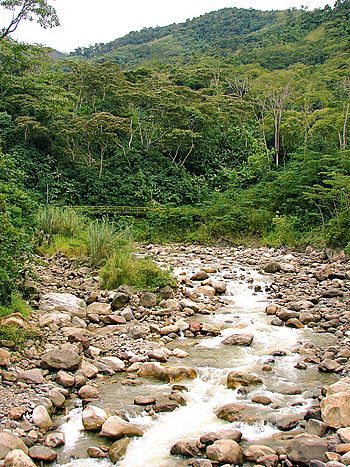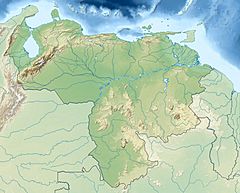Quinimarí River facts for kids
Quick facts for kids Quinimarí River |
|
|---|---|

The river at Río Chiquito
|
|
|
Mouth location in Venezuela
|
|
| Country | Venezuela |
| Physical characteristics | |
| River mouth | 7°40′16″N 72°14′56″W / 7.671115°N 72.249021°W |
| Basin features | |
| River system | Uribante River |
The Quinimarí River (Spanish: Río Quinimarí) is a river in northwestern Venezuela. It is an important waterway in the Táchira state.
Contents
About the Quinimarí River
The Quinimarí River starts high up in the Tamá Massif mountains. This area is known for its beautiful natural landscapes. The river then flows down the southern side of the Táchira depression.
Where Does It Start and Go?
The river is located in the Córdoba area of Táchira state. It joins with the Torbes River. After that, it flows into the Uribante River. The Uribante River is a branch of the Apure River. Finally, the Apure River flows into the mighty Orinoco basin. This means the Quinimarí River is part of a very large river system.
Why Is This River Important?
The land around the Quinimarí River is very good for farming. Farmers grow a lot of coffee and sugar cane here. The climate in these mountains is humid, which helps these crops grow well.
The river gets its name from the "Quenemaríes" people. They were an indigenous group who lived in this part of the Venezuelan Andes mountains long ago.
Towns Along the River
Several small towns and villages are located along the banks of the Quinimarí River. These include:
- San Vicente de La Revancha
- Río Chiquito
- La Petrolea
- Estación Santa Ana
- Santa Ana del Táchira (which is the main town of the municipality)
The Story of Oil Discovery
The town of La Petrolea is on the left side of the river. This place is famous because it's where oil exploration in Venezuela first began. This happened in 1878. A strong earthquake hit the area and caused "black gold," which is another name for oil, to come out of the ground. It appeared in a small stream called Quebrada La Alquitrana, very close to the Quinimarí River. Oil still comes out of the ground in small amounts here.
See also
 In Spanish: Río Quinimarí para niños
In Spanish: Río Quinimarí para niños
Sources
 | Charles R. Drew |
 | Benjamin Banneker |
 | Jane C. Wright |
 | Roger Arliner Young |


